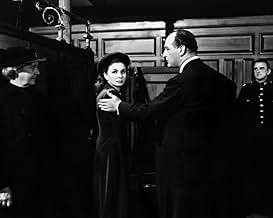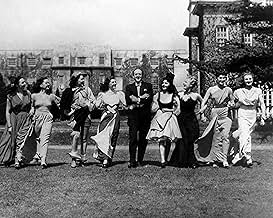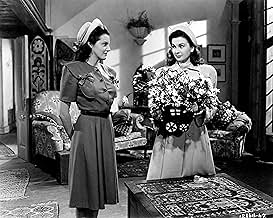IMDb RATING
6.5/10
172
YOUR RATING
A poor widow with two daughters augments her income by using her children to extort money. Visiting the houses of the rich people, they tell a sad story and beg for help. Then she meets a we... Read allA poor widow with two daughters augments her income by using her children to extort money. Visiting the houses of the rich people, they tell a sad story and beg for help. Then she meets a wealthy man who proposes marriage to her.A poor widow with two daughters augments her income by using her children to extort money. Visiting the houses of the rich people, they tell a sad story and beg for help. Then she meets a wealthy man who proposes marriage to her.
- Awards
- 1 win total
Jill Freud
- Molly Blake
- (as Jill Raymond)
Featured reviews
I loved the opening shot of the film. The camera is placed on the second floor of a grand house, overlooking the staircase and foyer. The opening credits roll, and as they taper off, there's a knock at the door. The butler answers, then retreats through the foyer to the door of the drawing room and announces the visitor to the lady of the house. The scene is perfectly framed; the audience is eavesdropping, desperately wants to know more about "the woman in the hall", and there's an overall sense of dread in the air.
Ursula Jeans is dressed in rags, as is her daughter. She tells the wealthy woman in the house a sob story about how her husband abandoned her and her children, and her youngest daughter is ill, and she doesn't have enough money. . . The wealthy woman believes her, writes her a check, and sends her on her way. The woman and the daughter go home, and the woman announces to her friend how successful her workday was. It's all a scam, and her sole source of income.
The story continues, with many twists and turns, and it's fascinating. Ursula Jeans gives an excellent performance in a perfect Joan Crawford role. She's icy, deceitful, but something burns beneath it all. . . Jean Simmons is gorgeous and troubled, a characterization she perfected in the previous year's Great Expectations. And it was thrilling to see Cecil Parker in a rare romantic role! This is a great movie with an interesting story that shows the hurts children carry with them as they grow up. The Woman in the Hall is very exciting and I highly recommend you watch it with a bunch of your friends on the next stormy weekend!
Ursula Jeans is dressed in rags, as is her daughter. She tells the wealthy woman in the house a sob story about how her husband abandoned her and her children, and her youngest daughter is ill, and she doesn't have enough money. . . The wealthy woman believes her, writes her a check, and sends her on her way. The woman and the daughter go home, and the woman announces to her friend how successful her workday was. It's all a scam, and her sole source of income.
The story continues, with many twists and turns, and it's fascinating. Ursula Jeans gives an excellent performance in a perfect Joan Crawford role. She's icy, deceitful, but something burns beneath it all. . . Jean Simmons is gorgeous and troubled, a characterization she perfected in the previous year's Great Expectations. And it was thrilling to see Cecil Parker in a rare romantic role! This is a great movie with an interesting story that shows the hurts children carry with them as they grow up. The Woman in the Hall is very exciting and I highly recommend you watch it with a bunch of your friends on the next stormy weekend!
Ursula Jeans has two daughters and a yen for a better life style than she can afford. So she goes among the wealthy, tells each of them a sob story, and gets some cash. One day one of the daughters, Jean Simmons, runs away and gets a job, and proceeds to give gifts to everyone.
There are a couple of loose ends in this movie, like Joan Miller's character, who seems to be a maid-of-all-work for Miss Jeans, I suppose the details of what she is doing there got lost in the transfer of G.B. Stern's novel to the screen. What we are left with are two very good performances. Miss Simmons, still early in her career, and gives a very waiflike and woebegone performance. Miss Jeans, gives a perfectly modulated performance that speaks volumes and says nothing. She wheedles and threatens her daughters - the other one is played by Jill Freud - and submits to threats in a manner that leaves one wondering if she actually cares about anything other than the pleasure of her successful confidence games. Her biggest one is landing Cecil Parker playing a surprisingly tender version of his comic fuddy-duddy.
It's a beautifully executed movie, but I'm left with a sense of dissatisfaction. What's the point of it all? Is it supposed to be a story of redemption? If so, in the end, it is trite. Is it a matter of a bravura performance? That's not really enough. Any movie that exists in its own little universe and has no meaning greater than itself is a pointless game. Even the most puzzle-like murder mystery is about the wrecking of the moral universe, and it's restoration by bringing the murderer to light.
Perhaps people take some interest in violence for its own sake, but even in the most chaotic of spaghetti westerns, there is is a conclusion and a warning. Perhaps that is the point of this movie: that a workable world has a balance between pure self-interest and generosity.
There are a couple of loose ends in this movie, like Joan Miller's character, who seems to be a maid-of-all-work for Miss Jeans, I suppose the details of what she is doing there got lost in the transfer of G.B. Stern's novel to the screen. What we are left with are two very good performances. Miss Simmons, still early in her career, and gives a very waiflike and woebegone performance. Miss Jeans, gives a perfectly modulated performance that speaks volumes and says nothing. She wheedles and threatens her daughters - the other one is played by Jill Freud - and submits to threats in a manner that leaves one wondering if she actually cares about anything other than the pleasure of her successful confidence games. Her biggest one is landing Cecil Parker playing a surprisingly tender version of his comic fuddy-duddy.
It's a beautifully executed movie, but I'm left with a sense of dissatisfaction. What's the point of it all? Is it supposed to be a story of redemption? If so, in the end, it is trite. Is it a matter of a bravura performance? That's not really enough. Any movie that exists in its own little universe and has no meaning greater than itself is a pointless game. Even the most puzzle-like murder mystery is about the wrecking of the moral universe, and it's restoration by bringing the murderer to light.
Perhaps people take some interest in violence for its own sake, but even in the most chaotic of spaghetti westerns, there is is a conclusion and a warning. Perhaps that is the point of this movie: that a workable world has a balance between pure self-interest and generosity.
The title led me to anticipate a candlelit Victorian drama, but it's actually very contemporary. That wartime and postwar austerity Britain were both rife with low-level criminality was regularly reflected in the feature films of the era, as when Will Hay found himself in the dock for writing begging letters in 'My Learned Friend' (1943).
This adroit melodrama adapted by Gladys Bronwyn Stern from her pre-war novel anticipates Basil Dearden's equally neglected 'Only When I Larf' (1968), which set its trio of confidence tricksters against a backdrop of swinging 60's affluence. One watches with appalled admiration the perennially quick-thinking amorality of Ursula Jeans in the title role as a seasoned confidence trickster who rather resembles Mary Astor (with her perpetual look of feigned wide-eyed innocence in 'The Maltese Falcon'), although she stops short of murder. Her career of lies and deception spans ten years and an hour and a half which has lovingly prepared you for a knockout closing line and close up.
As the more innocent of her two daughters a button-eyed ten year-old Susan Hampshire in her film debut ages satisfyingly into a radiant Jean Simmons. The rest of the cast are up to the usual high standard one expects of British films of this period, enhanced by skillful production design by Peter Proud.
Recommended.
This adroit melodrama adapted by Gladys Bronwyn Stern from her pre-war novel anticipates Basil Dearden's equally neglected 'Only When I Larf' (1968), which set its trio of confidence tricksters against a backdrop of swinging 60's affluence. One watches with appalled admiration the perennially quick-thinking amorality of Ursula Jeans in the title role as a seasoned confidence trickster who rather resembles Mary Astor (with her perpetual look of feigned wide-eyed innocence in 'The Maltese Falcon'), although she stops short of murder. Her career of lies and deception spans ten years and an hour and a half which has lovingly prepared you for a knockout closing line and close up.
As the more innocent of her two daughters a button-eyed ten year-old Susan Hampshire in her film debut ages satisfyingly into a radiant Jean Simmons. The rest of the cast are up to the usual high standard one expects of British films of this period, enhanced by skillful production design by Peter Proud.
Recommended.
Splendid concoction of the complications women sometimes end up with in their difficult dealings with reality as a tricky means of survival if once the men are out of their lives. It so happens that two men oblige these three drifting women with actually offering them their support and even marriage, which certainly no wise man would do in this case. The mother is a professional cheat, and her daughters are ruined in the trade, one of them (Jean Simmons) actually stealing from her employer and benefactor not realizing it is wrong, since she uses the money only for the good of others. Cecil Parker marrying the cheat is as awkward as ever, he never seemed to get any character right, but here at least he succeeds in turning a bleak story to almost a comedy. I love the scene in the restaurant, when suddenly the cheat of a mother together with her newly wedded husband (Cecil Parker) is confronted with the vengeful brother of the man who once deserted her and now intends to marry her daughter, who is also present, with her godmother, one of the benefactresses the mother has cheated. All these victims of her artfulness never seem to mind her tricks much but are pleased to recognize her swindle for what it is and make the best of it, to ultimately direct her out of her trade. The final court drama is a wonderful climax to this spicy confusion of intrigues and people involved in them, and the judge seems to enjoy it. Fascinating film, resembling no other, and it's an especially interesting study of women.
Ursula Jeans is marvellous in the straightness of her unhesitating continuous deceit. Note the very young Susan Hampshire as Jay in the beginning as a small girl.
Ursula Jeans is marvellous in the straightness of her unhesitating continuous deceit. Note the very young Susan Hampshire as Jay in the beginning as a small girl.
This has an intriguing story line which is not matched in the execution.The characters come across as rather unlikely combinations.None particularly sympathetic.A very young Jean Simmons comes over as being rather simple.In any event it takes atotally nonsensical courtroom scene to resolve matters.If she was as young as she looks she would have been sent to a juvenile court.
Did you know
- TriviaThis film's New York City television premiere occurred Tuesday 15 August 1950 on WNBT (Channel 4).
Details
- Release date
- Country of origin
- Official site
- Language
- Also known as
- The Woman in the Hall
- Filming locations
- Production companies
- See more company credits at IMDbPro
- Runtime1 hour 33 minutes
- Color
- Aspect ratio
- 1.37 : 1
Contribute to this page
Suggest an edit or add missing content






























